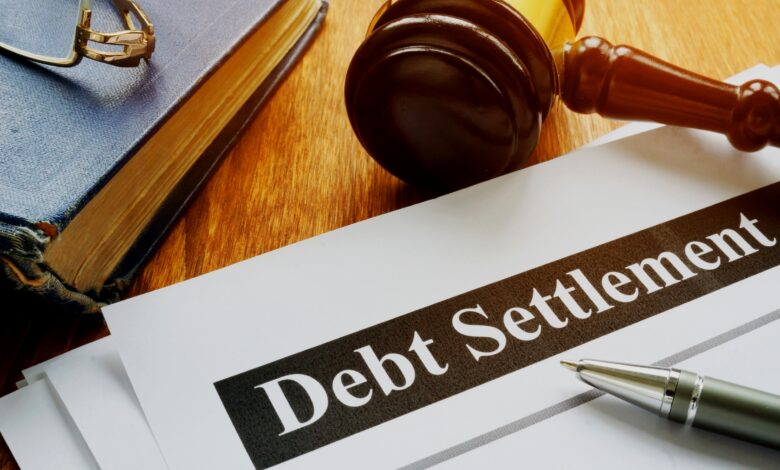Legal Help for Debt Settlement in Florida
This guide explains what Legal Help for Debt Settlement is, how it works in Florida, and why working with an experienced debt settlement attorney can protect your rights.

In today’s economy, financial struggles are more common than most people think. Between mounting credit card bills, medical expenses, student loans, and unexpected emergencies, many Floridians find themselves overwhelmed by debt. When this happens, seeking legal help for debt settlement can be a critical step toward financial recovery. This guide explains what debt settlement is, how it works in Florida, and why working with an experienced debt settlement attorney can protect your rights and give you the best path forward.
What Is Debt Settlement?
Debt settlement is a form of debt relief where a borrower negotiates with creditors to reduce the total amount owed. Instead of paying the full debt, you agree to pay a lump sum that’s typically less than what you originally owed. For people facing serious financial hardship, debt settlement can offer a faster and more affordable alternative to bankruptcy or prolonged debt repayment.
However, the debt settlement process can be legally complex and emotionally taxing. That’s why many individuals in Florida turn to legal help for debt settlement to ensure they are treated fairly by creditors and avoid unintentional legal consequences.
Common Types of Debt Eligible for Settlement
Debt settlement is most effective with unsecured debts. These typically include:
-
Credit card debt
-
Medical bills
-
Personal loans
-
Department store charge cards
-
Private student loans (in some cases)
-
Old utility bills or collection accounts
Secured debts, like car loans or mortgages, are not typically handled through debt settlement because they are tied to collateral.
Why You Might Need Legal Help for Debt Settlement
Many Florida residents are tempted by do-it-yourself (DIY) solutions or commercial debt relief companies. While these may offer quick solutions, they often come with hidden fees, poor results, and little legal protection. Seeking legal help for debt settlement from a Florida attorney ensures:
-
Creditor compliance with state and federal debt collection laws
-
Negotiation leverage to get a better deal
-
Review of settlement agreements to ensure fairness
-
Protection from lawsuits or wage garnishment
-
Clear guidance on whether debt settlement is your best option
Having an experienced lawyer on your side can make a major difference in the outcome of your settlement process.
Florida Debt Settlement Laws and Consumer Protection
Florida has specific laws in place to protect consumers seeking debt relief. Key points include:
Florida Consumer Collection Practices Act (FCCPA)
This act prohibits creditors and collection agencies from using abusive, harassing, or misleading tactics. Some illegal actions under FCCPA include:
-
Threatening arrest or legal action without cause
-
Calling at odd hours
-
Contacting you after being instructed to stop
-
Misrepresenting the amount or status of your debt
If a creditor violates your rights, a debt settlement attorney in Florida can help you take legal action and potentially sue for damages.
Federal Fair Debt Collection Practices Act (FDCPA)
The FDCPA is a federal law that supplements Florida’s regulations. It applies to third-party collectors and offers additional consumer protections. These laws are particularly important when negotiating settlements, as they limit the tactics creditors can use against you.
How the Debt Settlement Process Works in Florida
If you’re seeking help for debt settlement in Florida, understanding the typical process can set the right expectations.
1. Assessing Your Financial Situation
The first step is to determine whether debt settlement is the right path. A qualified attorney or legal counselor will evaluate:
-
Your total debt
-
Income and expenses
-
Credit score
-
Types of creditors involved
This helps decide whether a lump-sum settlement is feasible or if alternatives like debt consolidation, credit counseling, or bankruptcy are more appropriate.
2. Creating a Settlement Strategy
Once your situation is analyzed, your attorney will develop a tailored strategy. This includes:
-
Deciding which debts to settle first
-
Creating a savings plan for lump-sum offers
-
Preparing documentation to support your financial hardship
Having a strategy in place allows for smarter negotiations and greater success.
3. Negotiating with Creditors
This is where the real legal help comes in. Your attorney will contact your creditors or collection agencies to negotiate:
-
Reduced principal balances
-
Waived fees or interest
-
Payment terms or deadlines
Since creditors prefer collecting something rather than nothing, they’re often open to negotiation—especially when they know you’re represented by a legal professional.
4. Reviewing and Signing the Settlement Agreement
Before you pay, it’s crucial to have your settlement terms in writing. An attorney ensures:
-
The agreement is legally binding
-
The forgiven amount won’t come back as collectible later
-
The deal complies with Florida laws
This stage is essential for protecting you from future surprises.
5. Making the Settlement Payment
Most settlements involve paying a lump sum within a specific time. Once paid, the creditor must report the debt as “settled” or “paid in full for less than the full balance” to credit bureaus.
Your lawyer can also help you verify that the debt is cleared from your credit report.
Legal Help for Debt Settlement vs. Debt Consolidation
Many people confuse debt settlement with debt consolidation. Here’s the key difference:
-
Debt settlement involves negotiating to reduce what you owe.
-
Debt consolidation involves combining multiple debts into one monthly payment, usually with a lower interest rate.
Both options can provide relief, but debt consolidation doesn’t lower your principal balance. If you’re facing severe financial hardship, help for debt settlement may be more effective than consolidation.
When to Consider Bankruptcy Instead
In some cases, debt settlement may not be enough. If you:
-
Have little or no income
-
Are facing foreclosure or car repossession
-
Owe a large amount with no way to pay a lump sum
-
Have debts like taxes or student loans that can’t be settled
Then filing for Chapter 7 or Chapter 13 bankruptcy may be a better legal path. Your debt attorney will advise you on which route is best for your specific circumstances.
Finding the Right Legal Help for Debt Settlement in Florida
Choosing the right attorney is key to a successful outcome. Here’s what to look for:
1. Experience in Florida Debt Laws
Florida has unique consumer laws, so hire an attorney with specific experience in debt relief and settlement within the state.
2. Transparent Fee Structure
Avoid firms that demand large upfront fees or make unrealistic promises. Reputable debt attorneys will provide a clear and fair fee structure.
3. Client Reviews and Ratings
Check online reviews, bar association records, or testimonials to ensure the attorney has a good reputation and track record.
4. Free Initial Consultation
Most debt attorneys in Florida offer free consultations. Use this opportunity to ask questions, understand your options, and get a feel for the lawyer’s approach.
Benefits of Hiring a Debt Settlement Attorney in Florida
-
Avoid Scams: Many for-profit debt relief companies are not regulated and can leave you worse off. An attorney offers legal protection.
-
Lower Settlements: Lawyers are skilled negotiators who may get better settlement terms.
-
Avoid Legal Action: If creditors are threatening lawsuits, legal representation can stop wage garnishment or court action.
-
Tax Guidance: Forgiven debt may be taxable. Your attorney can guide you through IRS reporting rules and exemptions.
Real-Life Example: How Legal Help Made the Difference
Maria from Miami had $25,000 in credit card debt and was behind on her payments. She was receiving harassing calls and was worried about losing her car. After hiring a debt settlement attorney in Florida, the lawyer negotiated with all her creditors and settled her debt for just $10,000—paid over six months. The attorney also helped her file a complaint under the FCCPA against a collector using illegal tactics. In the end, Maria avoided bankruptcy, kept her assets, and regained peace of mind.
Final Thoughts: Don’t Wait to Get Help
If you’re struggling with debt, you’re not alone. Many Floridians are in the same boat—and there is a way out. Getting legal help for debt settlement ensures you’re protected and gives you the strongest negotiating power possible. Whether you’re facing credit card debt, mounting bills, or collections, a knowledgeable debt attorney can help you regain control of your finances and rebuild your life.











